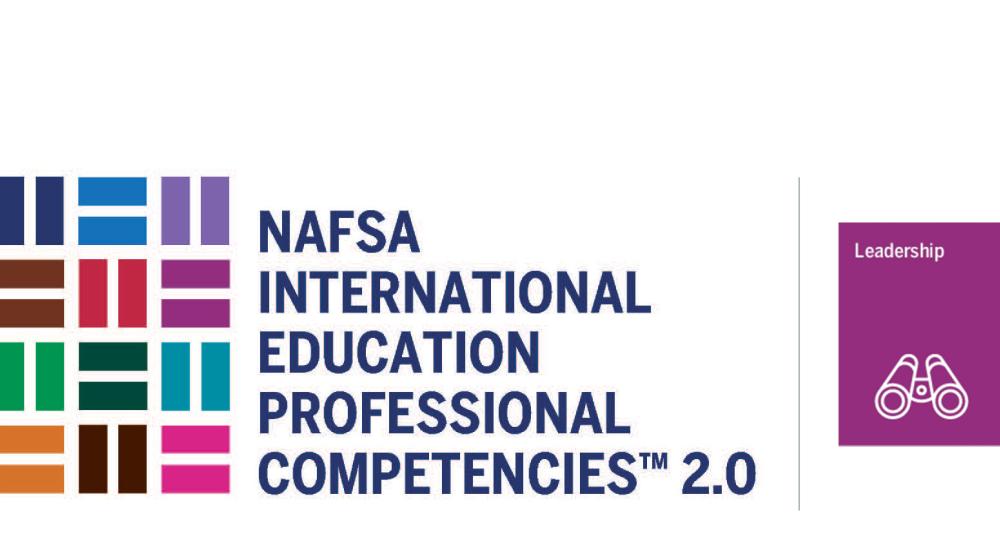Perspectives on Leadership: Learning by Doing

In any field, great leaders can be the key differentiator in building a healthy culture and inspiring those they lead to move the organization forward. The same is true in international education, where leaders often face unique challenges and uncertainties on a global scale. To effectively navigate these challenges, leaders need to have the right mix of empathy, resilience, and communication and decision-making skills.
International Educatorspoke with professionals from seven institutions and providers on what leadership in education abroad means to them and what they’ve learned throughout their leadership journeys. Here are their perspectives.
Editor’s note: Responses have been edited for clarity and length.
What’s surprised you about leadership?
Nicole Trevena Flores, Department Chair / Global Education Coordinator, Southeast Community College-Lincoln; co-chair of the NAFSA Community College Institutional Interest Group and the Caregivers in International Educators Interest Group; member, NAFSA subcommittee on Health and Safety in Education Abroad:
I was surprised to see how a leadership role opened so many doors. I suppose, looking back, it makes sense, but I didn’t realize just how much the role opens opportunities for further growth and learning. It has also been interesting to “look behind the curtain” with other leaders; it has humanized them in ways that made working with them so much less intimidating.
Neal J. McKinney, Director, Study Abroad and Internship Operations, AIFS Abroad:
I have been surprised to learn that leadership is not a very concrete concept. How leadership is shown depends a lot on the context—you need to adapt it to the environment you find yourself in. I have also found that collective leadership is the most valuable type of leadership, even though it isn’t highlighted as often.
Holly Hudson, Associate Vice President, Global Engagement, and Senior International Officer, Texas A&M University; chair, NAFSA subcommittee on Federal Financial Aid for Education Abroad; 2024 recipient of NAFSA’s Education Abroad Leadership Award
I've been surprised by how essential transparency and authenticity are in leadership. To succeed as a leader, I've learned the importance of bringing your complete self to the table. The more transparent you are about what is going on in business and, to an extent, your life, the better equipped you are to connect with your team and tackle issues together.
The conventional approach of compartmentalizing and shielding teams from higher-level issues doesn’t resonate [with staff]. Transparency fosters stronger connections with your team and enables more effective problem-solving. Embracing authenticity allows for deeper trust and understanding within the team, ultimately leading to better outcomes.
Transparency fosters stronger connections with your team and enables more effective problem-solving. Embracing authenticity allows for deeper trust and understanding within the team, ultimately leading to better outcomes.
Marilyn J. Jackson, Assistant Vice President, International Education, San Francisco State University
While there are certain constants, I am often surprised by the variety and novelty of situations that arise. Someone will come into the office or an email will ping, and I’ll think, “Nope, that was not on my bingo card.” That keeps life in this field interesting and challenging.
Emelee Volden, Director, International Education, University of Denver
What’s surprised me the most is the value of trust with my staff. This has always been a personal priority of mine, and I assumed it came automatically with time. But I’ve learned that I can’t just assume others trust me, I have to earn it and I have to show it. This is shown in how I communicate, how I hold others (and myself) accountable, and how I build a relationship with each individual on my team.
Heather Funk Theodoridi, Director, International Programs and Student Services, American College of Thessaloniki
What initially surprised me the most about leadership was the amount of time it took to get buy-in from individuals on the team and how much they were influenced by one another. Rather than focusing on ideas and goals, much of my time was spent navigating the interpersonal side of teamwork, which requires a different set of tools and skills than the work itself. Over the years, I have enjoyed building a toolbox that has supported my own growth and that has helped others grow in their positions.
Sara Dart, Senior Vice President, Education in Ireland, Enterprise Ireland
It seems obvious now, but leadership isn’t at all about a title or even a role; it’s a way of approaching your role and your engagement within the field. You don’t need to have a fancy title or manage a big team—it’s just about the ways you encourage and support the people around you.
What makes education abroad leaders most effective?
Trevena Flores: Vulnerability and a willingness to ask for help. A willingness to learn from others and not be the expert. An ability to be quiet and just listen.
McKinney: Adaptivity and collaboration.
Hudson: A hallmark of effective education abroad leaders is their ability to connect with people across cultures and backgrounds and to sensitively and diplomatically navigate diverse perspectives. They are adept "people people" who build relationships and foster collaboration abroad and at home.
Education abroad leaders are also effective problem solvers who can identify root causes and implement solutions. They need to be flexible and adaptable in order to navigate complex challenges and crises while maintaining poise and engendering confidence from students, faculty, parents, and staff.
I think most education abroad leaders are also naturally inquisitive and continuously seek to expand their understanding of global trends, educational practices, and cultural dynamics.
Generally speaking, we tend to be people who are very relational in nature, with high emotional intelligence, who believe deeply in the work we do.
Jackson: The ability to set goals, balanced with the necessary flexibility, courage, and imagination to meet challenges as they present themselves. These are the same qualities we look for in our study abroad students.
Volden: Patience and flexibility (in both our professional and personal lives). The ability to remain very calm in stressful situations and calmly talk through anything personal or professional with a member of the team is also important. Life happens to all of us, and when it does, we have to be flexible in order to navigate changes and challenges and adapt on the spot.
Funk Theodoridi: Passion for ensuring quality and leading transformation.
Dart: Generally speaking, we tend to be people who are very relational in nature, with high emotional intelligence, who believe deeply in the work we do.
In what ways do you empower individuals on your team to do their best work?
Trevena Flores: Putting folks where their strengths lie makes all the difference. Helping them to recognize their strengths is often a key element to that. I also try my best not to micromanage. It really does tell your team that you have no trust in their abilities, and if you’ve been intentional about the work they do, then hopefully you won’t have to micromanage.
McKinney: I invest in asking them about their goals and needs not only in their current role but also looking into the future. Not everyone will want to take on additional responsibilities or roles, but I still want them to seek out growth opportunities that help them feel engaged in their work.
Putting folks where their strengths lie makes all the difference. Helping them to recognize their strengths is often a key element to that.
Hudson: I try to empower my team by encouraging them to bring their whole selves to work. I think this is critical to fostering an inclusive and supportive environment. I do my best to acknowledge their efforts and celebrate successes, while also sharing responsibility for any missteps or mistakes.
Jackson: I am very fortunate to have a very talented team. They are a mix of experienced longtime professionals and folks who are new to the field and come with fresh ideas. All my colleagues believe in the importance of international education and want to do the best for the students and campus that we serve. With that as a baseline, I try to celebrate their strengths and listen to their ideas. Sometimes they need my support, sometimes they need me to help smooth a path, and sometimes they need me to get out of the way so they can try new ideas. I want them to know that I support them, have their backs, and will take responsibility for hard choices. Especially important after the pandemic, I [also] encourage good self-care habits. When people take care of themselves, they have the capacity to show up for others.
Volden: I make a point to support the ideas and passion projects that my team members have, and I allow them to run with those ideas. If I can find opportunities for them to develop their skills or further their interests, I will support this wholeheartedly, knowing that it will fulfill them and may indirectly contribute to our overall work. I also don’t believe anyone is tied to a position forever. I fully support my team in pursuing opportunities that meet their desires and ambitions—even if that means leaving our team—if these aren’t possible in their current position.
Funk Theodoridi: I have had the luxury to distribute the work largely based on individuals’ interests and skills. I have also been able to adjust work responsibilities so that everyone is working on something that they have a particular interest in. I also encourage our team to use the professional development budget to deepen their knowledge in areas that are related to their job. During our weekly meetings, I make a conscious effort to regularly incorporate personal development exercises. My 1:1 biweekly meetings with my team members are important for me to ensure that we are on the same page and to head off any issues as they arise. The team says that the most significant thing we do is our end-of-semester debrief, which includes a meal and an open conversation about the previous term. They unanimously agree that this time spent together is the most important time of the year. For me, I think the combination of all these intentional touch points are the secret to earning buy-in and empowering individuals to do their best work.
Dart: Micromanaging people just does not work. You must trust your team. If you develop a culture of trust, people are inherently more motivated to work harder and more likely to come to you when they’re struggling or might have messed up.
For those who aren’t in what are commonly thought of as leadership positions, how can they participate in or practice leadership?
Trevena Flores: Say yes. I understand the need for balance in life, but I also know that the opportunities that I was interested in but nervous about were the opportunities that led to the most growth and joy. They don’t all have to be big opportunities either—take the little ones, too.
McKinney: Figure out what you are passionate about, communicate those passions to those around you as much as you can, and find communities or organizations that can help you nurture your passions.
Hudson: Practicing leadership involves embodying qualities that positively influence the team. Consistently showing up and being present is fundamental. Sharing ideas demonstrates initiative, while listening fosters respect. Asking questions shows curiosity and a willingness to learn, and helping out, even with small tasks, shows a team-oriented attitude.
Jackson: I believe that everyone has something to teach and something to learn. In an ideal situation (and we know that things are not always ideal), people can participate in leadership by teaching what they know— by speaking up, sharing ideas, and, when necessary, speaking truth to power. They can also learn from others, from mistakes, from experience—and be willing to apply that knowledge and share it with others.
Figure out what you are passionate about, communicate those passions to those around you as much as you can, and find communities or organizations that can help you nurture your passions.
Volden: Intentionally look for professional development opportunities to further develop your leadership skills. There are so many resources available through our professional organizations, our institutions, and our state systems.
Funk Theodoridi: Everyone has an area of influence, and that is where their leadership is born. People start practicing leadership in informal ways before they formally supervise people, which is what is usually thought of as leadership.
At the end of my first semester of college, I competed for a scholarship in which leadership roles played a role. At the time, I had not been in a leadership role before, so I highlighted the ways in which I chose to be a leader—organizing transportation for weekend events, leading study groups, taking on weekly voluntary roles at community organizations. Though none of my titles were “leader” or “boss,” I had responsibility and influence. During the scholarship interview, I specifically recall one of the interviewers telling me that the ways in which I viewed myself as a leader did not count as leadership. The comment stuck with me, and to this day I disagree. As a director, I now take opportunities to talk with the incoming students about the ways in which they can intentionally choose to build leadership experience in nontraditional ways. These experiences are valuable opportunities to begin building their leadership skill set.
Dart: One avenue to leadership outside a traditional role is to develop subject matter expertise. Find a niche within the field that you’re interested in and passionate about and then learn everything you can about it. Present about it, post about it on LinkedIn, write articles about it. Become a go-to person for that topic. This is something that has worked really well for me, and I’ve had a few of these areas throughout my career—it started with career integration, for a while it was marketing to Gen Z, and these days it’s Ireland and jobs in education abroad. Your “thing” can, and perhaps should, evolve and change throughout your career. The idea is that it’s an opportunity to distinguish yourself and to build your personal brand in a way that is also beneficial for the field. •
NAFSA Resources
About International Educator
International Educator is NAFSA’s flagship publication and has been published continually since 1990. As a record of the association and the field of international education, IE includes articles on a variety of topics, trends, and issues facing NAFSA members and their work.
From in-depth features to interviews with thought leaders and columns tailored to NAFSA’s knowledge communities, IE provides must-read context and analysis to those working around the globe to advance international education and exchange.
About NAFSA
NAFSA: Association of International Educators is the world's largest nonprofit association dedicated to international education and exchange. NAFSA serves the needs of more than 10,000 members and international educators worldwide at more than 3,500 institutions, in over 150 countries.
NAFSA membership provides you with unmatched access to best-in-class programs, critical updates, and resources to professionalize your practice. Members gain unrivaled opportunities to partner with experienced international education leaders.














